Legrand Electric Ltd. Bundle
How did Legrand Electric Ltd. Transform from Porcelain to Powering the World?
Journey back in time to uncover the remarkable transformation of Legrand Electric Ltd., a company with roots in 1865 France. From its humble beginnings as a porcelain tableware workshop, Legrand charted a course toward becoming a global leader in electrical and digital building infrastructures. Discover how this Legrand Electric Ltd. SWOT Analysis reveals the strategic shifts and innovations that propelled its evolution.
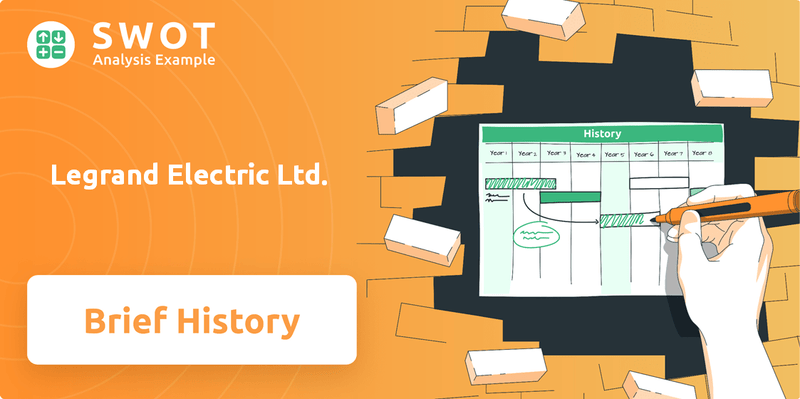
The story of Legrand Electric Ltd. is a compelling case study in adaptability and strategic vision. Explore the key milestones, from its early days as a French company to its current status as a major player in the electrical industry. Understanding the Legrand history provides valuable insights into the dynamics of the global market and the importance of innovation in the face of changing demands.
What is the Legrand Electric Ltd. Founding Story?
The story of Legrand Electric Ltd., a prominent electrical company, began in 1865. It started as a porcelain tableware workshop in Limoges, France, founded by Henri Barjaud de Lafond and Léonard Clidasson.
Over time, the business evolved, eventually focusing on electrical components. This shift was a strategic move that positioned the company for significant growth in the electrical industry.
In 1897, Jules and François Vultury acquired the business, setting the stage for future developments. The crucial turning point came in 1904 when Frédéric Legrand, Charles Alary, and Jean Joquel took over, renaming it Legrand, Alary & Joquel Company. Frédéric Legrand's name became a permanent part of the company's identity. Initially, the company produced porcelain tableware but expanded into electrical components in 1919 by partnering with Jean Mondot, who manufactured electric switches. This marked the beginning of utilizing porcelain for electrical fittings.
- The company's early focus was on porcelain tableware.
- In 1919, Legrand began producing electrical switches.
- The company's name was permanently established as Legrand.
- The shift to electrical components was a strategic move.
A significant event occurred in 1949, a factory fire led to a strategic decision. The company decided to concentrate solely on electrical wiring devices, abandoning the porcelain business by 1950. This strategic pivot was well-timed with the post-war reconstruction in France and Europe, driving demand for housing construction and industrial modernization.
Legrand Electric Ltd. SWOT Analysis
- Complete SWOT Breakdown
- Fully Customizable
- Editable in Excel & Word
- Professional Formatting
- Investor-Ready Format
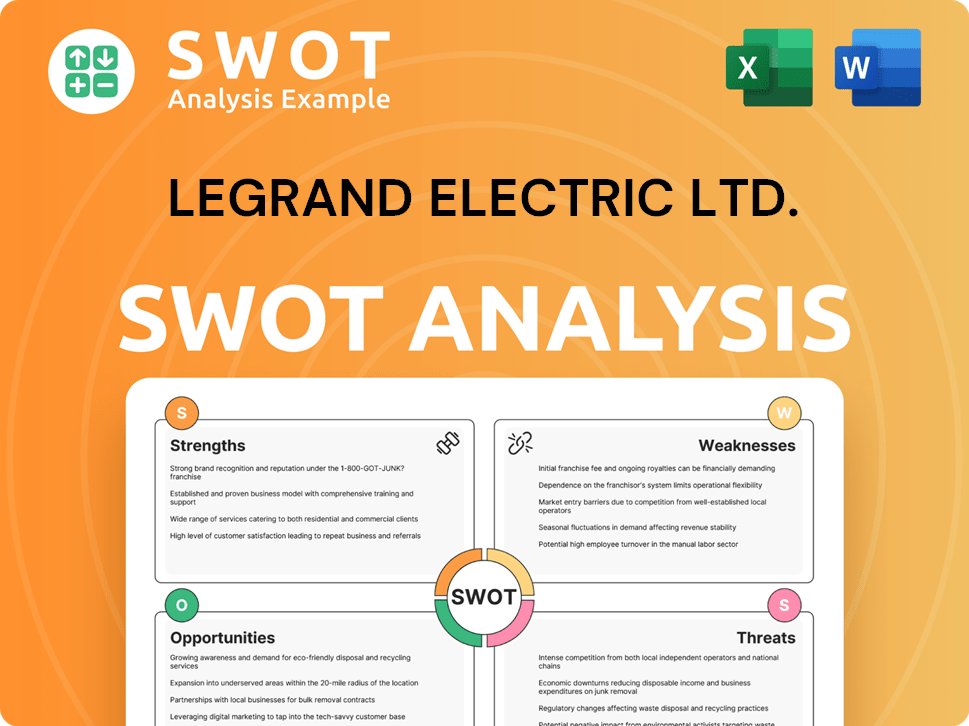
What Drove the Early Growth of Legrand Electric Ltd.?
Following its strategic pivot to electrical wiring devices in 1949, the Legrand Electric Ltd. experienced significant growth and expansion. This period saw the company broadening its product portfolio and extending its geographical reach. The strategy included both organic growth and strategic acquisitions, solidifying its position as a key player in the electrical industry.
After 1949, the French company quickly expanded its product range beyond wiring devices. This included protection products like fuse-holders and circuit breakers, cable management solutions, and emergency lighting. This diversification broadened its appeal within the electrical equipment market.
By 1953, Legrand had already outgrown its original Limoges location. The company established two additional plants within the city to meet growing demand. This expansion reflected early success and the need to scale up production capabilities.
The acquisition of Electro Sécurit in 1956, later renamed Legrand Antibes, marked a pivotal shift. This acquisition strategy focused on integrating smaller companies with strong market positions. This approach accelerated growth within the electrical company.
International expansion began in 1966 with a subsidiary in Belgium. Further expansion included the takeover of Pial in Brazil in 1977 and Pass & Seymour in the United States in 1984. These moves established a global presence for Legrand products.
Legrand Electric Ltd. PESTLE Analysis
- Covers All 6 PESTLE Categories
- No Research Needed – Save Hours of Work
- Built by Experts, Trusted by Consultants
- Instant Download, Ready to Use
- 100% Editable, Fully Customizable
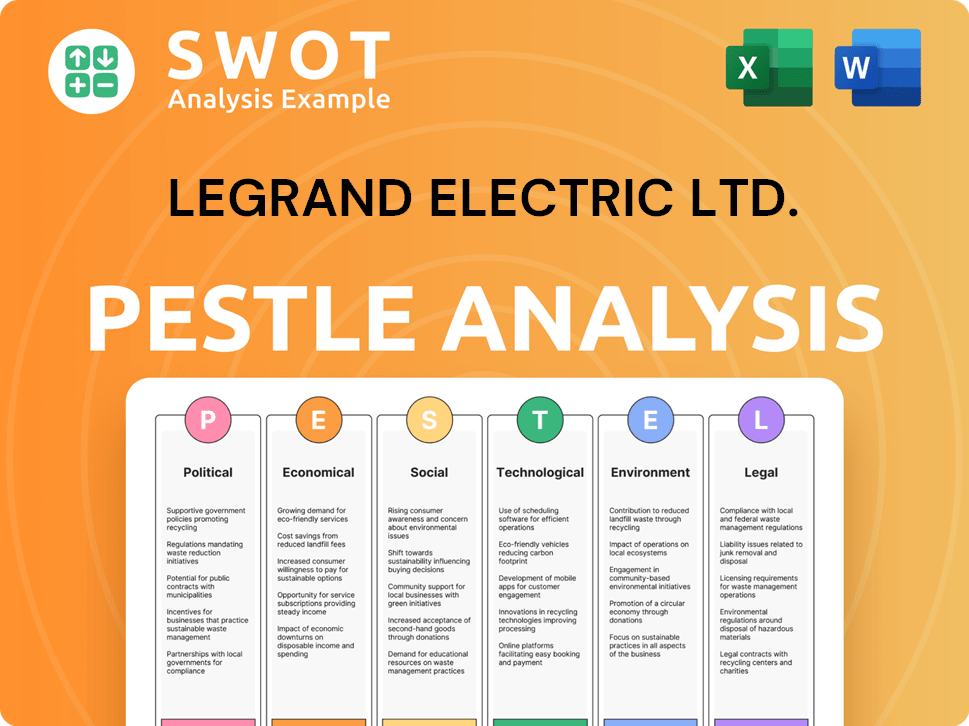
What are the key Milestones in Legrand Electric Ltd. history?
The Legrand Electric Ltd company's journey is marked by significant milestones, reflecting its evolution and adaptation within the electrical industry. This French company has consistently expanded its global presence and product range.
| Year | Milestone |
|---|---|
| 1919 | Introduction of electrical switches using porcelain, a groundbreaking innovation. |
| 1949 | Strategic shift to focus exclusively on electrical wiring devices following a factory fire. |
| 1954 | Commencement of acquisitions, a key strategy for growth. |
| 2024 | Completion of 9 acquisitions, totaling approximately €430 million in annual sales. |
| 2025 | The company holds 6,351 total documents for applications and grants. |
Legrand Electric Ltd has consistently demonstrated innovation, leading to the development of various Legrand products. The company's focus on innovation is evident through its substantial patent portfolio and continuous new product launches.
In 1919, Legrand introduced electrical switches using porcelain, a notable advancement for its time. This innovation set a new standard in electrical safety and efficiency.
After the 1949 factory fire, Legrand strategically focused on electrical wiring devices. This pivot allowed the company to specialize and gain expertise in this area.
Legrand has expanded into data center solutions, which now account for 20% of its sales. This move reflects the company's adaptation to new market demands.
The company is actively developing solutions for energy and digital transitions. This strategic focus positions Legrand for future growth in sustainable technologies.
Legrand is investing in digitalization to improve its operations and production capacity. These investments enhance efficiency and responsiveness to market changes.
As of June 2025, Legrand has a strong patent portfolio with 6,351 total documents for applications and grants. This demonstrates a commitment to ongoing innovation.
Despite its successes, Legrand Electric Ltd has faced challenges. These challenges include external pressures and market fluctuations.
In 2024, Legrand navigated a generally depressed building market in many geographies. This required strategic adjustments to maintain performance.
Tariff measures impacted the company, with an estimated impact of $150 million to $200 million. Legrand responded with strategic measures to mitigate these effects.
Legrand has addressed supply chain issues through reorganization and optimization. This has improved efficiency and reduced costs.
The electrical company has adapted to various market fluctuations. This has involved price adjustments and strategic investments.
Legrand faces competition from other players in the electrical industry. The company's innovation and acquisitions help it maintain a competitive edge.
Economic downturns pose challenges for the electrical company. Legrand has responded with cost optimization and efficiency improvements.
Legrand Electric Ltd. Business Model Canvas
- Complete 9-Block Business Model Canvas
- Effortlessly Communicate Your Business Strategy
- Investor-Ready BMC Format
- 100% Editable and Customizable
- Clear and Structured Layout
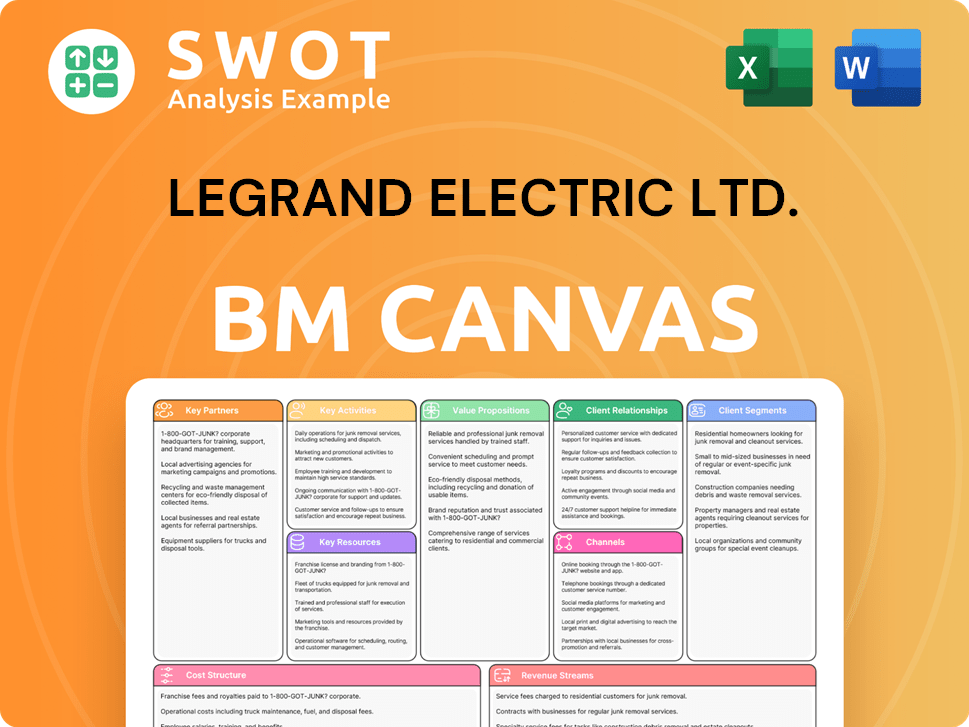
What is the Timeline of Key Events for Legrand Electric Ltd.?
The Legrand Electric Ltd journey is marked by strategic shifts and global expansion, transforming it from a porcelain workshop into a leading electrical company. This brief history of Legrand Electric Ltd showcases its growth through key acquisitions and a commitment to innovation. The company's evolution underscores its adaptability and vision in the electrical industry.
| Year | Key Event |
|---|---|
| 1865 | Establishment of a porcelain tableware workshop in Limoges, France, marking the beginning of the Legrand history. |
| 1904 | Frédéric Legrand, Charles Alary, and Jean Joquel acquire the business, with 'Legrand' becoming part of the company name. |
| 1919 | The company partners with Jean Mondot to produce electric switches using porcelain. |
| 1949 | A strategic shift to exclusively focus on electrical wiring devices after a factory fire. |
| 1956 | First acquisition, Electro Sécurit (renamed Legrand Antibes), expanding its product portfolio. |
| 1966 | First international subsidiary established in Belgium, signaling its global expansion. |
| 1970 | Legrand is listed on the Paris stock exchange, increasing its visibility and access to capital. |
| 1977 | First subsidiary outside Europe established in Brazil, broadening its international footprint. |
| 1984 | First subsidiary in the United States with Pass & Seymour, marking a significant entry into the North American market. |
| 1989 | Acquisition of BTicino, Italy's largest electrical equipment manufacturer, strengthening its market position. |
| 2017 | Acquisition of Milestone AV, a US manufacturer of AV racks and mounts, diversifying its offerings. |
| 2018 | Acquisition of Netatmo, a smart home company, expanding into the connected home market. |
| 2022 | Acquisition of UK cooling firms USystems and French electrical power company Voltadis, strengthening its data center position. |
| 2024 | Achieves sales of €8.6 billion with 3.9% growth, and 9 acquisitions announced, demonstrating continued growth. |
| 2025 (Q1) | Reports strong sales growth of +11.2% (organic and acquisitions) and adjusted operating margin of 20.7%, indicating robust financial performance. |
The company aims for sales between €12 billion and €15 billion by 2030. In 2024, Legrand achieved sales of €8.6 billion. The data center segment is expected to see accelerating organic growth in 2025, representing a key growth area.
Legrand projects sales growth of between +6% and +10% for the full year 2025. The adjusted operating margin is expected to hold stable compared to 2024. The company's focus on solutions supporting the energy and digital transition will drive this growth.
Legrand is committed to its sixth Corporate Social Responsibility (CSR) roadmap for 2025-2027. A target of at least a 100% CSR achievement rate is set for the first year. This includes reducing Scope 1 and 2 emissions by 10% by 2027 compared to 2024.
The company's forward-looking strategy remains rooted in innovation and targeted acquisitions. Legrand is focused on a balanced global presence. Data centers accounted for 20% of sales in 2024, highlighting a key area of investment.
Legrand Electric Ltd. Porter's Five Forces Analysis
- Covers All 5 Competitive Forces in Detail
- Structured for Consultants, Students, and Founders
- 100% Editable in Microsoft Word & Excel
- Instant Digital Download – Use Immediately
- Compatible with Mac & PC – Fully Unlocked
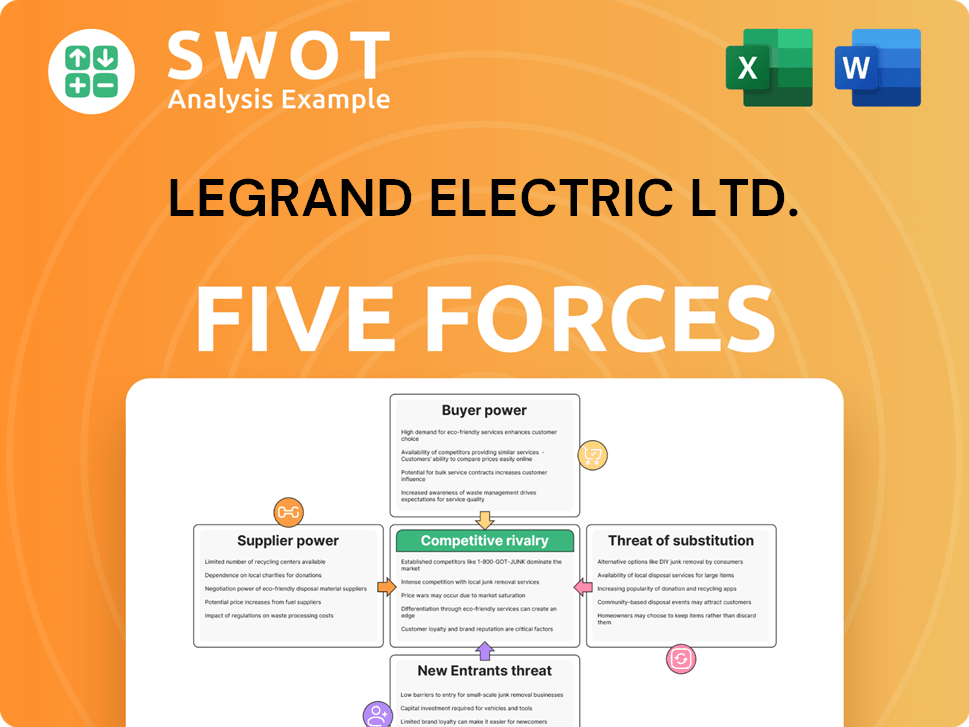
Related Blogs
- What is Competitive Landscape of Legrand Electric Ltd. Company?
- What is Growth Strategy and Future Prospects of Legrand Electric Ltd. Company?
- How Does Legrand Electric Ltd. Company Work?
- What is Sales and Marketing Strategy of Legrand Electric Ltd. Company?
- What is Brief History of Legrand Electric Ltd. Company?
- Who Owns Legrand Electric Ltd. Company?
- What is Customer Demographics and Target Market of Legrand Electric Ltd. Company?
Disclaimer
All information, articles, and product details provided on this website are for general informational and educational purposes only. We do not claim any ownership over, nor do we intend to infringe upon, any trademarks, copyrights, logos, brand names, or other intellectual property mentioned or depicted on this site. Such intellectual property remains the property of its respective owners, and any references here are made solely for identification or informational purposes, without implying any affiliation, endorsement, or partnership.
We make no representations or warranties, express or implied, regarding the accuracy, completeness, or suitability of any content or products presented. Nothing on this website should be construed as legal, tax, investment, financial, medical, or other professional advice. In addition, no part of this site—including articles or product references—constitutes a solicitation, recommendation, endorsement, advertisement, or offer to buy or sell any securities, franchises, or other financial instruments, particularly in jurisdictions where such activity would be unlawful.
All content is of a general nature and may not address the specific circumstances of any individual or entity. It is not a substitute for professional advice or services. Any actions you take based on the information provided here are strictly at your own risk. You accept full responsibility for any decisions or outcomes arising from your use of this website and agree to release us from any liability in connection with your use of, or reliance upon, the content or products found herein.